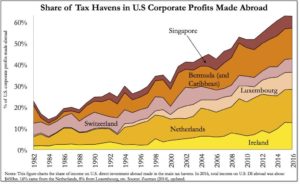Where has all the surplus gone? – David F. Ruccio

Thanks to the release of the so-called Paradise Papers, and to the research conducted by Gabriel Zucman, Thomas Tørsløv, and Ludvig Wier [1], we know that a large share of the surplus that is captured by corporations is artificially shifted to tax havens all over the world. This is on top of the conspicuous tax evasion practiced by the individual holders of a large portion of the world’s wealth.
Thus, for example, U.S. multinational corporations claim to generate 63% of their foreign profits in six tax havens, the most prominent of which are the Netherlands, Bermuda and the Caribbean, and Ireland. This is 20% more than in 2006.*
What this means is that, within the tax havens themselves, low tax rates can generate large tax revenues relative to the size of their economies. But it also means large multinational corporations can play off one tax haven against the others, and shift their profits to those with the most generous laws and regulations — as Apple has recently done, by relocating tens of billions of dollars from Ireland to the small island of Jersey (which typically does not tax corporate income and is largely exempt from European Union tax regulations).
It also means that the putative home countries of the multinational corporations lose potential tax revenues from those corporations, which is another way of saying that these tax evaders become wealthier while the other tax payers in those countries become poorer in terms of net income.
In the case of the U.S., Zucman and his colleagues estimate that the U.S. loses almost 60 billion euros to tax havens (about three quarters from European Union tax havens and the rest from tax havens elsewhere), which amounts to about 25% of the corporate tax revenue it currently collects.
As Zucman explains, Tax havens are a key driver of global inequality, because the main beneficiaries are the shareholders of the companies using them to dodge taxes. Clearly, the existing rules are such that large multinational corporations win
twice: first, by capturing more and more surplus from their workers, whose wages have barely budged in recent decades; and second, by using tax havens to avoid paying taxes on a large portion of that surplus, thus shifting the tax burden onto workers at home.
* The chart is based on data made publicly available by Zucman, Tørsløv, and Wier
Source Real World Econ Rev, 15 Nov 2017 https://rwer.wordpress.com/2017/11/15/where-has-all-the-surplus-gone-4/



























